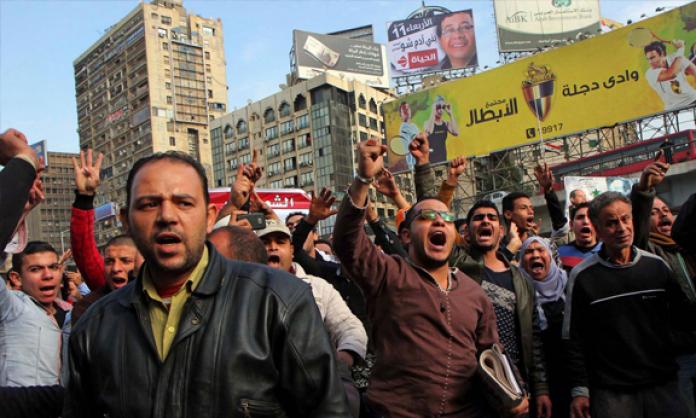In Egypt, counter-revolution stalks the makers of an uprising the whole world lauded.
Workers, the poor, women, Muslims and Coptic Christians, who in 2011 united against a tyrannical regime to demand a decent society, have been plunged back into repression, sectarian division and impoverishment on a scale unprecedented in modern Egyptian history.
At the head of this counter-revolution is Abel Fattah el-Sisi, the supreme commander of the Egyptian army. He came to power by commandeering the 2013 revolt against the Muslim Brotherhood government. Sisi was able to transform opposition to the Brotherhood government and its leader Mohammad Morsi into support for what was essentially a military coup that dramatically ended more than two years of revolutionary upheavals.
The powerbrokers of the old regime had been waiting for the right moment to reassert their class power politically. Morsi did everything he could to ingratiate himself with Egyptian capital and the deep state with which it is intertwined, but they were determined the Muslim Brotherhood would not be allowed to carve out a space for itself as a manager of the Egyptian state.
The judiciary, the state security chiefs, the army generals with their vast share of Egyptian capital and the obscenely wealthy business elite rallied behind Sisi. After he took power, these forces, with the backing of the urban middle classes and (shamefully) sections of the liberal and Nasserite left, were able to generate a fictitious but devastating narrative designating the Muslim Brotherhood as terrorists and fascists.
Only weeks after the military regime was installed, it realised its full brutality in a terrible massacre of Muslim Brotherhood protesters outside Cairo’s Rabaa al-Adawiya Mosque. In what Human Rights Watch has described as “a premeditated assault, equal to or worse than China’s Tiananmen Square Massacre in 1989”, more than 800 peaceful protesters were gunned down and then incinerated.
In the aftermath, small sections of the left in Egypt denounced the massacre, notably the Revolutionary Socialists, who described it as “a bloody dress rehearsal for the liquidation of the Egyptian revolution”. The military, they wrote, “aims to break the revolutionary will of all Egyptians who are claiming their rights, whether workers, poor, or revolutionary youth, by creating a state of terror”.
Tragically, this prediction proved correct; so too the warning that all who criticised the regime would suffer the kind of repression initially meted out to Muslim Brotherhood supporters.
Since the Rabaa massacre, the Muslim Brotherhood constantly has been likened to ISIS. Sisi preys on people’s fears about the chaos unfolding in Iraq, Syria and Yemen to create hysteria about terrorism and maintain total acquiescence in his rule.
A spate of deadly bombings in Egypt in the past year, targeting the judiciary and corrupt officials, has been attributed to the Muslim Brotherhood; some have been claimed by ISIS, allowing the regime to connect the two groups.
Amid all the chaos in Egypt, one thing is clear: the real terrorist threat right now is the Sisi regime.
All media other than state media have been banned or heavily censored. State media are used by Sisi to project the key messages of the regime, which is the generator of fear and distortions about the threat of terrorism in Egypt, and then the self-proclaimed saviour of the people, their only line of defence.
Sisi has compared himself to former president Gamal Abdel Nasser, who holds a revered place in the Egyptian psyche and is remembered as an anti-imperialist, Arab nationalist and kind of socialist by many.
The difference of course is that Nasser, whilst no anti-capitalist or Marxist, did stand up to Western powers that had bullied Egypt for decades. Nasser nationalised important sections of the economy, creating real improvements in the lives of many Egyptian workers.
Sisi, by contrast, is a tyrant hell-bent on burying the revolution and the social and economic demands that it raised. He has welcomed back the US with open arms, recently accepting delivery of eight new F-16 fighter jets, and there are more to come. The US does not care that Sisi’s regime has unleashed repression on an unprecedented scale. Neither do the rulers of Europe, if judged by their embrace of Sisi in recent visits. From Angela Merkel of Germany to Alexis Tsipras of Greece, Sisi has been welcomed to the club of world leaders.
No one in that club said anything about Sisi jailing more than 40,000 opponents, including socialists, leftists, trade unionists, journalists and bloggers.
Torture is now widespread, as is death from torture. A new term, “Egypt’s disappeared”, designates students and political activists who have been kidnapped by the regime. Around 200 people have disappeared since April this year – some have since turned up dead.
Protests have been banned, as have strikes. Journalists are increasingly silenced, most recently with the introduction of a new, highly repressive anti-terrorism law.
Sisi has attempted to impose austerity on a scale Mubarak did not even dream of, making drastic changes to fuel and bread subsidies. Under pressure from the IMF, Egypt has a plan to reduce massively the energy subsidies relied on by millions of workers and the poor. Last November, a leak outlined Sisi’s plans to eliminate all subsidies on bread and energy and reduce public sector salaries by 50 percent.
Even the long-suffering Palestinians, whose cause was elevated by the 2011 revolution, have not escaped Sisi’s repression. His regime continues to aid Israel’s suffocation and blockade of Gaza by blowing up tunnels at the Rafah crossing and closing the border with Egypt for long periods.
Understandably, the impact of this repression has been great and hugely demoralising at times. How could it not be when people’s hopes altered so radically after decades of deprivation and repression?
It is impossible to say how new fronts may open from which to launch new waves of struggle against the counter-revolution. The current situation is probably unsustainable because of the level of repression and oppression within Egypt and the regional instability, particularly in places like Saudi Arabia – which is bankrolling the Sisi regime. In a recent interview with Tariq Ali, Sameh Naguib, a leading member of the Revolutionary Socialists said:
“Hundreds of thousands of young Egyptians experienced an actual revolution … occupied streets and squares all over the country. This experience is not going to evaporate. It can be defeated, but it’s not going to be easy. They will not be able to repress a whole generation.”
He pointed out that a key element of this revolutionary experience was the unprecedented presence and unity of women, Coptic Christians, Muslims and minority groups in their fight against their common enemy; a unity once again broken by Sisi’s strategy of exploiting sectarian divisions and worsening the oppression of women and minority groups.
The other sides of despair are anger and hope. There is fertile ground in Egypt for revolt. The El-Mahrousa Center for Socioeconomic Development in Egypt reports there have been 778 strikes this year, mostly in the private sector and in defiance of the anti-strike laws. The numbers are small compared to the momentous strike waves during the revolution, but important.
So too is the bravery of revolutionaries like Shaimaa el-Sabbagh, an activist killed by police this year for protesting a day before the anniversary of the 2011 uprising.
Defiance still lives in Egypt, if only in the hearts and minds of a generation of young people and revolutionaries. Hearts and minds need “bread, freedom and social justice” though, and the Egyptian people are today denied that, and will be until they rise up again.











